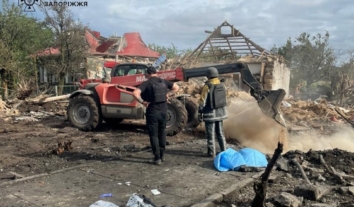Russian media is an important link in the chain of intimidation against Crimeans under occupation – ZMINA human rights advocate
Russian media plays a crucial role in intimidating Crimeans with pro-Ukrainian views in Ukrainian territories temporarily occupied by the Russian Federation – a statement made by Viktoriia Nesterenko, a human rights advocate from the Human Rights Centre ZMINA, during the First Crimea Week in Brussels.
 Viktoriia Nesterenko. Photo from social networks
Viktoriia Nesterenko. Photo from social networksNesterenko reached this conclusion after analysing the coverage of cases in the Crimean occupation “courts” by Russian media.
Nesterenko reiterated that such cases are typically based on illegal accusations of espionage and treason against residents of the occupied territories. These cases are entirely classified, and very often, not only relatives but even the defendants themselves do not know the exact charges for which they are being convicted.
Recently, the occupying authorities have intensified the persecution of women in Crimea. According to the Human Rights Centre ZMINA, there are currently over 25 such cases with various charges. Russian journalists are the only ones with access to court decisions in these cases; they can even obtain permission to attend hearings and then actively disseminate information through the media. Their goal is to intimidate residents of the occupied territories and suppress any desire to resist Russian occupation.
“Such a policy — to intimidate so that dissenters understand that any resistance will be punished with long prison sentences — is very typical for Russians,” Nesterenko stated.
She explained that the Human Rights Centre ZMINA has been monitoring the human rights situation in occupied Crimea since the annexation of the peninsula in 2014. During this period, numerous violations have been recorded, particularly against journalists, activists, and the pro-Ukrainian population.
“Today, we have more than 200 political prisoners, the majority of whom are Crimean Tatars — 133 individuals. Most of them have been deported by the Russians to serve their sentences in Russia, far from Crimea. The Crimean Tatars themselves refer to this as a ‘quiet deportation’,” she clarified.
According to Viktoriia Nesterenko, this process works as follows: the Russian occupying authorities create conditions where individuals must either leave on their own, or if they resist and are not loyal to the Russian authorities, they are persecuted, illegally convicted, and deported far from Crimea.
She emphasised the importance of speaking out about the human rights violations and breaches of international humanitarian law committed by the occupying power.
“Essentially, this is the only way to stop these persecutions. First and foremost, we must safeguard the interests of our people who remain under occupation, whose rights are constantly violated — people who for over ten years have been unable to express their opinions freely,” said Viktoriia Nesterenko.
Read also: Russians illegally detain Crimean activist Yunus Masharipov in a psychiatric hospital for five years
Earlier, ZMINA reported that the photo exhibition “Crimea Through the Eyes of Citizen Journalists,” showcasing their work on the occupied peninsula, was presented at the European Parliament’s information point in Brussels. The exhibition was initiated by the Human Rights Centre ZMINA and took place as part of the First Crimea Week at the European Parliament.









